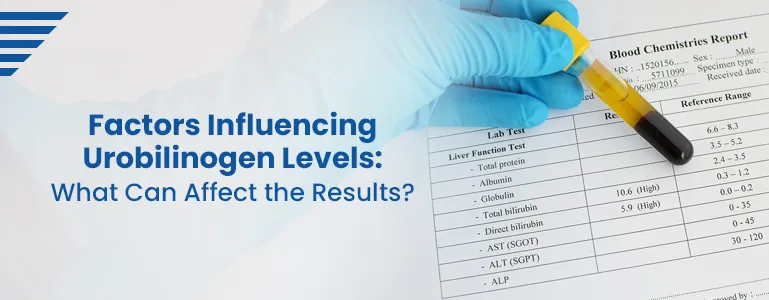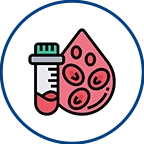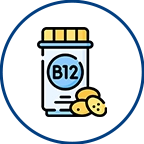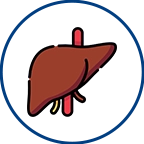Factors Influencing Urobilinogen Levels: What Can Affect the Results?

Urobilinogen is a compound that plays a crucial role in the breakdown of hemoglobin in the body. It is produced in the liver as a result of the degradation of bilirubin, a byproduct of the destruction of red blood cells. Urobilinogen is then excreted through the urine, where its levels can provide valuable insights into the functioning of the liver and the overall health of an individual. However, various factors can influence urobilinogen levels, leading to fluctuations in test results. In this blog, we'll explore the factors that can affect urobilinogen levels and their implications for healthcare.
Liver Function : The liver is primarily responsible for the production of urobilinogen. Any impairment in liver function, such as hepatitis, cirrhosis, or other liver diseases, can affect the liver's ability to produce urobilinogen. In such cases, urobilinogen levels may be lower than normal, indicating a potential problem with the liver.
Hemoglobin Breakdown : Urobilinogen is a byproduct of the breakdown of hemoglobin in the body. Conditions that result in excessive red blood cell destruction, such as hemolytic anemia or certain genetic disorders like sickle cell disease, can lead to elevated urobilinogen levels. These conditions increase the amount of bilirubin produced, subsequently affecting urobilinogen levels in the urine.
Medications : Certain medications, such as antibiotics, antimalarial drugs, and certain pain medications, can influence urobilinogen levels. These drugs may impact liver function or alter the balance of bilirubin breakdown, leading to changes in urobilinogen production and excretion.
Bacterial Overgrowth : The gut microbiota play a role in the conversion of bilirubin into urobilinogen. Changes in the composition of gut bacteria due to factors like infections, dietary changes, or antibiotic use can impact this conversion process, potentially affecting urobilinogen levels.
Diet and Hydration : Dehydration can concentrate urobilinogen levels in the urine, leading to higher readings. On the other hand, a well-hydrated state can dilute urobilinogen levels, potentially masking any underlying issues. Additionally, certain foods and dietary choices can influence bilirubin production and thus affect urobilinogen levels.
Liver Enzyme Deficiencies : Deficiencies in enzymes involved in bilirubin metabolism can lead to altered urobilinogen levels. For example, Gilbert's syndrome is a genetic disorder It may cause slightly higher levels of urobilinogen by affecting the enzyme responsible for digesting bilirubin.
Pregnancy : Pregnancy can impact urobilinogen levels due to hormonal changes, increased red blood cell turnover, and potential liver alterations.These aspects should be taken into account by medical professionals when interpreting urobilinogen levels in expectant women.
Home Sample Collection
Conclusion
Urobilinogen levels are a valuable indicator of liver function and overall health. Interpretation of these levels requires a comprehensive understanding of the various factors that can influence them. Healthcare providers must consider a patient's medical history, medications, diet, and other relevant factors when assessing urobilinogen test results. Any significant deviations from the normal range may warrant further investigation to identify potential underlying health conditions that require attention.
Frequently Asked Questions
What is urobilinogen, and why is it important?
Urobilinogen is a compound produced in the liver as a result of bilirubin breakdown.Red blood cell lysis produces bilirubin as a waste product. Urinary excretion of urobilinogen is used to evaluate the liver's overall condition and capacity.
How does liver function affect urobilinogen levels?
The liver is responsible for producing urobilinogen. Impaired liver function, often seen in liver diseases like hepatitis or cirrhosis, can lead to lower urobilinogen levels since the liver's ability to produce it is compromised.
Can medications influence urobilinogen levels?
Yes, certain medications can impact urobilinogen levels. Drugs that affect liver function or the breakdown of bilirubin can lead to changes in urobilinogen production and excretion.
What role does diet play in urobilinogen levels?
Diet can influence urobilinogen levels indirectly by affecting bilirubin production and metabolism. Additionally, hydration status can also influence urobilinogen concentration in urine.
How does bacterial overgrowth in the gut impact urobilinogen levels?
The gut microbiota help convert bilirubin into urobilinogen. Changes in gut bacteria due to factors like infections, diet changes, or antibiotic use can affect this conversion process, potentially altering urobilinogen levels.
Are there any genetic factors that can affect urobilinogen levels?
Yes, genetic factors can play a role. Conditions like Gilbert's syndrome, which affects the bilirubin processing enzyme, can lead to slightly elevated urobilinogen levels.
Can pregnancy influence urobilinogen levels?
Yes, pregnancy can impact urobilinogen levels due to hormonal changes, increased red blood cell turnover, and potential liver changes. These things should be taken into account by medical professionals when interpreting urobilinogen levels in expectant women.
What are the potential implications of abnormal urobilinogen levels?
Abnormal urobilinogen levels can indicate underlying health issues. Low levels could point to liver dysfunction, while elevated levels could suggest conditions like hemolytic anemia, liver diseases, or enzyme deficiencies.
How can healthcare providers ensure accurate urobilinogen level interpretation?
Healthcare providers should consider a patient's medical history, medications, diet, and hydration status when assessing urobilinogen levels. Contextualizing results within the broader clinical picture is crucial for accurate interpretation.
Are urobilinogen tests routine?
Urobilinogen tests are not part of routine check-ups but may be included when investigating liver function, hemolytic disorders, or other health concerns related to bilirubin metabolism.
Can lifestyle changes impact urobilinogen levels?
Yes, lifestyle changes such as dietary adjustments, staying hydrated, and managing medications can influence urobilinogen levels. A healthy lifestyle can improve overall wellbeing and improve liver function.
Is additional testing necessary if urobilinogen levels are abnormal?
Yes, abnormal urobilinogen levels should prompt further investigation. Healthcare providers may order additional tests to pinpoint the underlying cause of the abnormality and determine appropriate treatment.
Can urobilinogen levels be used as a standalone diagnostic tool?
Urobilinogen levels are a valuable piece of diagnostic information but are typically considered alongside other clinical data and tests for a comprehensive assessment of a patient's health.
Can urobilinogen levels change temporarily?
Yes, urobilinogen levels can vary due to factors like hydration status, recent meals, and medications. Therefore, a single abnormal result may not always indicate a chronic health issue.
Are there any age-related variations in urobilinogen levels?
While age itself may not be a direct factor, certain health conditions that affect urobilinogen levels may vary in prevalence across different age groups.
Book Your Slot
Our Locations Near You in Hyderabad
3KM from Banjara Hills
1.9KM from Yusufguda
3KM from Madhura Nagar
5KM from Shaikpet
Profiles
- Cardiac Risk Profile
- Pituitary marker Profile
- Rheumatoid Arthritis Profile
- Dengue Fever Panel
- Lung Cancer Panel 1 Complete Molecular
- Gastroenteritis Screening Panel
- Thyroid Profile (T3,T4,TSH), Serum
- Pancreatic Marker Profile
- STD profile
- Androgen Profile
- Lipid Profile, Serum
- Pancreatic(acute)Profile
- PCOD Profile
Radiology
Pathology Tests
- Glucose Fasting (FBS),Sodium Fluoride Plasma
- Creatinine, Serum
- Glycosylated Hemoglobin (HbA1C)
- Vitamin B12 (Cyanocobalamin), Serum
- Thyroid Stimulating Hormone (TSH) Ultrasensitive, Serum
- Complete Urine Examination (CUE), Urine
- Liver Function Test (LFT),Serum
- Dengue (IgG & IgM), Serum
- Dengue Antigen (Ns1) Rapid, Serum
- C-Reactive Protein (CRP), Serum
- Widal (Slide Method), Serum
- Total IgE, Serum




